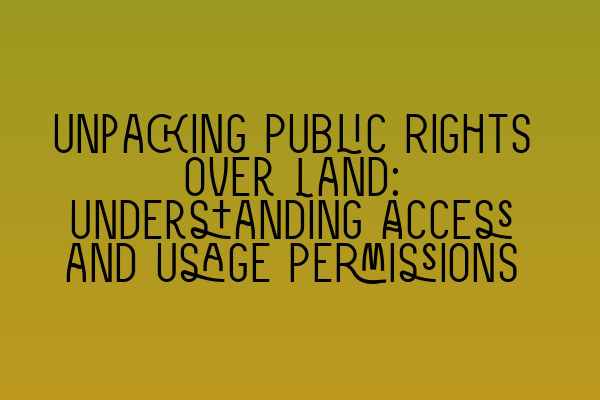Unpacking Public Rights over Land: Understanding Access and Usage Permissions
Welcome to the SQE Property Law & Land Law blog! In this article, we will delve into the fascinating realm of public rights over land, focusing specifically on access and usage permissions. Understanding these rights is essential for property owners, tenants, and anyone involved in property transactions, as they can have significant implications on land use and enjoyment. So, let’s get started!
The Basics of Public Rights over Land
Public rights over land refer to the legal entitlements that members of the public have to access and use certain areas of land. These rights can be either statutory or customary, and they are often established to provide public access to natural resources, historical sites, and recreational spaces.
Statutory rights over land are created by legislation, while customary rights are based on long-standing local practices. It is crucial to determine the origin and scope of these rights before engaging in any activities that may be affected by them.
Access Permissions
Access permissions, as the name suggests, deal with the right of individuals to access specific areas of land. These permissions can take various forms, including:
- Public Footpaths: These are dedicated paths established for pedestrian use. They are usually marked with signs and maintained by local authorities. Public footpaths provide a safe and convenient way for people to explore the countryside and enjoy the great outdoors.
- Public Rights of Way: Similar to public footpaths, public rights of way are routes that can be used by pedestrians, cyclists, and sometimes horse riders. They are broader in scope and allow for more diverse usage.
- Access to Coastal Areas: In the UK, the public generally has the right to access coastal areas, including beaches and foreshores. However, it’s important to be aware of any specific restrictions or regulations that may apply in certain regions.
- Access to National Parks and Nature Reserves: National parks and nature reserves are often subject to special access provisions. These areas are typically protected for their natural beauty, wildlife, and ecological importance. Public access may be regulated to preserve the environment and prevent damage.
When dealing with access permissions, property owners and occupiers must be mindful of their responsibilities to maintain the integrity and safety of these public rights. They should refrain from obstructing or interfering with legally established access routes, ensuring that members of the public can exercise their rights without undue hindrance.
Usage Permissions
Usage permissions relate to the activities that individuals are allowed to carry out on specific areas of land. These permissions can be subject to various restrictions and regulations, which are designed to balance the rights of the public with the interests of property owners.
Common examples of usage permissions include:
- Recreational Activities: Public rights may allow for recreational activities such as walking, picnicking, and birdwatching. However, it’s important to note that not all forms of recreation may be permitted in every location. For example, some nature reserves may prohibit certain activities to protect fragile ecosystems.
- Fishing and Hunting: Public rights over land may grant individuals the right to fish in rivers, lakes, or coastal areas, as well as to engage in hunting activities in certain circumstances. Again, these permissions often come with specific regulations and licensing requirements.
- Grazing and Pasturing: In agricultural areas, public rights may include the right to graze livestock on common land or rights of common. These rights have historical origins and are often tied to specific communities or landowners.
- Events and Festivals: Public rights over land can also encompass the permission to hold events, festivals, or gatherings in designated areas. Local authorities may have specific procedures in place for obtaining permits and ensuring compliance with health and safety regulations.
Property owners should familiarize themselves with the usage permissions associated with their land to avoid potential conflicts and legal issues. If unsure about the scope or limitations of these permissions, seeking legal advice would be a prudent course of action.
Implications for Property Transactions
Understanding public rights over land is crucial when engaging in property transactions. Whether you are buying, selling, or leasing property, it is essential to consider any public rights and their potential impact.
For buyers and tenants, knowledge of public access and usage permissions can help assess the desirability and value of a property. Factors such as proximity to public footpaths or recreational areas may significantly influence purchasing decisions.
When selling or leasing property, property owners must disclose any public rights over the land to prospective buyers or tenants. Failure to do so may result in legal disputes and financial liabilities.
Incorporating public rights considerations into property transactions requires expertise and thorough due diligence. It is essential to engage qualified legal professionals who specialize in property law to ensure compliance with applicable regulations and avoid pitfalls.
Conclusion
Public rights over land play a significant role in ensuring public access to natural and recreational spaces. Understanding access and usage permissions is essential for property owners, tenants, and those involved in property transactions.
If you want to stay up-to-date with the latest developments in property law, make sure to check out our related articles:
- Updates in UK Property Laws: Key Changes and Implications
- Legal Challenges in Property Transactions: A Comprehensive Guide
- Navigating Lease Laws in the UK: Essential Guidelines for Tenants and Landlords
- Dominate Property Law Questions: Avoiding Common Pitfalls
- Land Law Revision Tips: Ace Your Exam Preparation
If you require legal assistance or advice regarding public rights over land or any property law matters, don’t hesitate to contact SQE Property Law & Land Law. Our team of experienced solicitors and property law experts is here to help you navigate the complexities of property law and ensure the best outcomes for your property-related endeavors.
